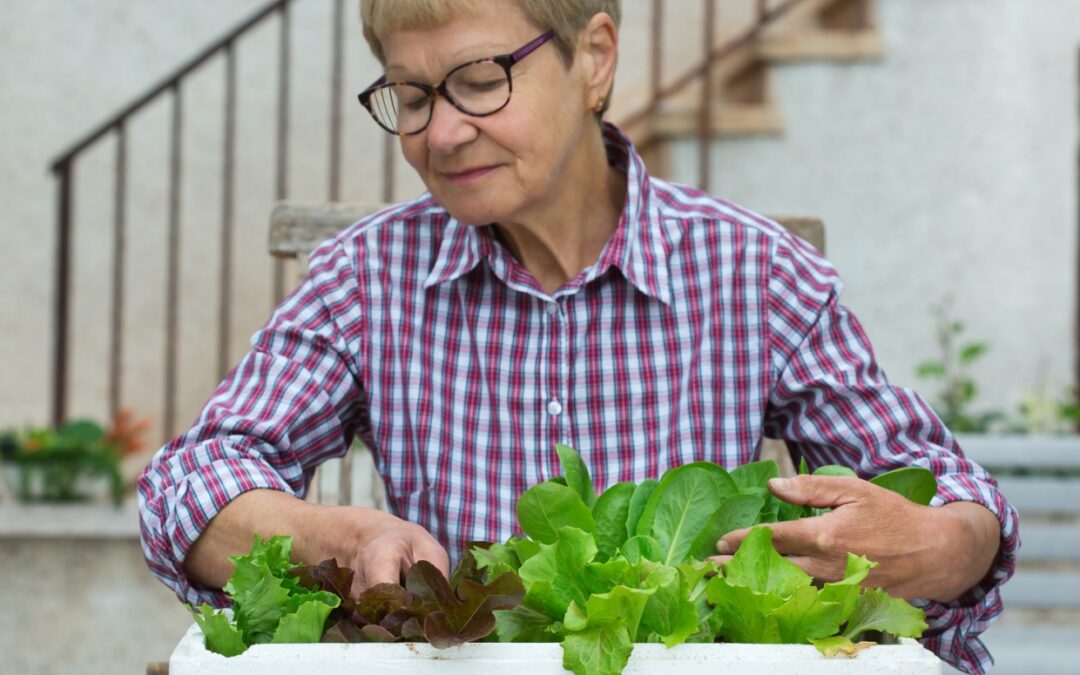
by wendigoadmin | Apr 17, 2024 | Franklin Care Blog
As aging progresses, nurturing mental and physical well-being becomes more significant. Especially for the elderly who are cared for at home, being constantly involved in brain-stimulating activities is essential to maintaining an overall sense of health and vigor. At Franklin Home Health Agency we are dedicated to providing customized care plans with a variety of activities to suit each client.
In this piece, we will discuss the importance of creating a dynamic home environment for elderly people and some enriching activities that can be done from their homes.
The Importance of Stimulating Activities
Seniors often face challenges like social isolation, monotony, and cognitive decline which have a profound impact on their general life quality. Taking part in exhilarating activities acts as a formidable weapon against these situations by fostering social interaction, cognitive function, and physical fitness. These improvements made in turn enhance mood, reduce stress levels as well as bring about selffulfillment.
At Franklin Home Health Agency, we understand that everyone has unique interests, skills, and preferences. Thus we prioritize the development of personalized care plans that incorporate stimulating engagements customized to each client’s specific needs or abilities.
Activities for Seniors at Home
- Creative Pursuits: Senior adults should be encouraged to explore art and crafts such as painting and sculpturing because it is very rewarding. Set aside space with various art materials where clients can express themselves artistically. From sketching sessions to craftwork or modeling tasks there exists no end to ways people can use creatively their resources. So getting involved in creative works not only helps one’s mind but also brings out feelings of pride and accomplishment.
- Nature Therapy: Older individuals stand to gain much from associating with nature both mental and physical health benefits. Whether it involves looking after plants in pots; taking leisurely walks within the community or simply being outdoors enjoying natural beauty creates calmness in the mind. Gardening particularly is therapeutic as it involves gentle exercise, exposure to sunlight, and the ability to nurture.
- Musical Exploration: Music has a way of bringing back memories, boosting moods, as well as keeping the mind alert among elders. Advise clients to try out different types of music and have some singing or playing instruments sessions or listen to their favorite tracks. Music therapy can be tailored according to an individual’s preferences and abilities: that is why it makes people happy and allows them to express their emotions even better.
- Mental Stimulation: For seniors to keep their minds working and healthy, there should be some level of engagement in mental activities. Bring up brain games, puzzles, or trivia to enhance mental agility and memory retention. Activities like crosswords, Sudoku, or word games provide pleasant ways of challenging the mind thus enhancing cognitive function. Also reading books, solving riddles, or learning new things can offer mental nourishment even in old age thereby promoting lifelong learning.
- Virtual Exploration: Seniors are now able to go on virtual tours without leaving home thanks to the evolution of technology. Arrange for a visitation virtually in museums such as those with historical background; and natural reserves for educational purposes. Additionally, they should encourage the elderly to seek information online by attending virtual lectures or participating in video calls with relatives and friends from other places using digital platforms. The possibilities under this kind of exploration are endless just like any other means of gaining knowledge but also interacting socially with others.
Physical activity which encompasses gentle exercises like stretching, yoga, or tai chi is crucial in the maintenance of mobility and strength hence the overall health and independence among senior citizens. Resistance training using lighter weights or elastic bands can aid enhance muscle tone as well as balance. Physical fitness not only contributes to good body health but also enhances an individual’s mood, energy levels, and general wellbeing.
CONCLUSION
Having a stimulating environment at home assists in promoting elderly people’s welfare and contentment. At Franklin Home Health Agency, we have committed ourselves to designing personalized care plans that contain myriad exciting activities customized for each client based on their distinct interests and requirements. We aim to foster a lively and satisfying home through art, nature, music, mind games, virtual exploration, exercise, etc so that seniors can live happily here together with their dear ones. Let us travel together in search of enlightenment; let us ensure all elderly persons lead meaningful lives using delighting them at every turn they make in life.

by wendigoadmin | Mar 3, 2024 | Franklin Care Blog
We all look for peace in familiar surroundings, the comforting embrace of home. Ensuring a safe environment capable of mobility becomes important for patients under the care of Franklin Home Health Agency. In many cases, prevention of falls begins at home and is essential for one’s independent living style.
In this article, we will discuss the significance of safety when it comes to mobility, giving helpful advice that may be used by you or your loved one to navigate around your homes comfortably.
UNDERSTANDING THE NEED FOR SAFE MOBILITY
Franklin Home Health Agency is a light in dark times, helping patients transition smoothly from medical facilities back to societal life. The emphasis on safe mobility in people’s houses goes beyond preventing falls only; rather, they aim at creating an= atmosphere that leads to well-being. Sometimes falls can be especially detrimental to those who are recovering from illnesses or have had surgery; thus, approp
CREATING A SAFE HOME ENVIRONMENT
A secure home starts with an organized layout and identification of potential hazards. Regarding guaranteed security during mobility movement plans Franklin Home Health Agency has developed appropriate housing designs. They include:
Remove Obstacles: To prevent tripping hazards path ways should be clear of any form of clutter. Furniture should be arranged to create easily navigable spaces whereas electrical cords must be away from them.
Proper Lighting: Proper lighting is crucial for safe mobility hence all areas should be sufficiently illuminated such as hallways, staircases, and bathrooms. At nighttime nightlights are essential in bedrooms and hallways to aid navigation.
Non-Slip Flooring: Always go for flooring materials that offer good traction. Area rugs should have non-slip backing while loose carpets or rugs must be fastened down since Franklin Home Health Agency puts more emphasis on slip-resistance.
Bathroom Safety: For instance, grab bars should be installed close to toilets and in the shower or bathtub. In wet areas, there should be non-slip mats to avoid accidents. A raised toilet seat can provide added comfort and safety.
PERSONALIZED CARE PLANS FOR SAFE MOBILITY
At Franklin Home Health Agency, personalized care plans are an unshakable commitment. The agency recognizes differences in each client’s physical and mental abilities hence customizing activities and interventions accordingly. Here is how personalized care plans contribute to safe mobility:
Physical Exercise: Regular tailored physical exercises play a significant role in maintaining strength and balance. Specific activities are encouraged by Franklin Home Health Agency, which suits individuals as they move gradually through the process of improvement with absolute safety.
Fall Prevention Education: Information is power when it comes to fall prevention. Franklin Home Health Agency staff educate both patients and their families on the potential risks of falls, enabling them to make informed decisions about their daily routines.
Assistive Devices: Canes or walkers for instance are recommended and supplied by the agency to aid safe mobility. The agency assesses the needs of each client before selecting appropriate devices that will become part of their daily lives.
COMMUNITY ENGAGEMENT & MENTAL WELL-BEING
Mental well-being cannot be ignored as part of this safe mobility issue according to Franklin Home Health Agency. Engaging with people in society and engaging in meaningful activities are essential for holistic wellness. It assists its clients with access to community events thereby personalizing athome activities that encourage interaction among people who reside there and mental stimulation.
Franklin Home Health Agency (Community Events:) collaborates actively with local community organizations to provide clients with an opportunity to socialize. Franklin Home Health Agency always encourages community involvement, be it cultural events a recreational outing, or a support group.
At-Home Activities: The agency recognizes that for some clients their homes are the best places where they can feel at ease hence plans and modifies home-based activities. ….. These activities address the preferences and abilities of clients like art crafts and music therapy
NAVIGATING CHALLENGES WITH FRANKLIN HOME HEALTH AGENCY
The journey to safe mobility is not without its challenges, and Franklin Home Health Agency understands the importance of a supportive network. This may involve coordinating with physicians, communicating with insurance carriers, or linking them with needed facilities to ensure a smooth transition for patients.
Family Involvement: Franklin Home Health Agency involves family members actively in their care. Thus, family contribution is paramount when making personalized care plans that enable them to tackle issues associated with safe mobility.
Physician Collaboration: The collaboration between physicians is vital for the approach taken by Franklin Home Health Agency. Consequently, establishing a cohesive strategy for safe mobility means that regular communication is important since it helps align the care plan with medical recommendations.
Insurance Coordination: However, this daunting task is handled by Franklin Home Health Agency when it comes to navigating through insurance processes. The firm also coordinates with insurance agencies to minimize the frustrations of customers as well as unnecessary financial strains on them.
Facility Liaison: Franklin Home Health Agency plays this role as a link between clinical practice settings and patients returning to communities. It works jointly with these institutions to facilitate a smooth transfer process that guarantees the safety and well-being of its clients.
CONCLUSION
In search of safety during movement, Franklin Home Health Care stands out as a center for compassion. Through expert navigation of challenges, addressing each client’s unique needs, and promoting wellness in every way possible, Franklin Home Health Agency paves the way for home wellness. With their health and happiness as the top priority, clients can become more independent, knowing that they have the support of a dedicated team of professionals to help them improve their mobility safely. Let safety echo through our home halls as we walk confidently towards an encompassing life with a sound mind and body.

by wendigoadmin | Feb 3, 2024 | Franklin Care Blog
The benefits of individualized care plans extend far beyond the provision of medical needs. One of them is tailored medical attention. Different seniors usually have unique medical needs that require specific interventions; hence personalized care plans ensure that each older person receives appropriate treatments and support specific to his or her health conditions.
As the aged population escalates at an exceptional rate, so does the demand for high-quality senior care. To recognize how different seniors are in terms of their needs, Franklin Home Health Agency has positioned itself as a committed provider that gives personalized care plans. This piece delves into why individualized care plans are important for seniors and how Franklin Home Health Agency stands out in providing customized services.
Franklin Home Health Agency’s approach to elderly care is centered around individualized care plans. Unlike generic solutions that fit everybody, these plans are carefully designed to cater to the specific needs, preferences, and health conditions of every person under their watch. This personalized approach is all about taking physical illnesses into account as well as other aspects affecting an old person emotionally and socially.
Choosing Franklin Home Health Agency as a personal home-care provider signifies a proactive step towards ensuring that seniors receive the attention and support required to thrive in their later years. The agency acts as a dedicated partner in creating and implementing individualized care plans, using a vast range of resources. These resources include family members, physicians, insurance carriers, and necessary facilities thereby ensuring an easy transition for clients back into the community.
For Franklin Home Health Agency, one-on-one stimulation with clients is fundamental to their philosophy. Unlike institutional care settings that may prioritize managing groups, the agency recognizes the intrinsic value of individual attention. Thus, it engenders closer relationships between caregivers and elderly people fostering trust, comfort, and emotional wellness.
The active promotion of one-on-one engagement is integral to this agency’s commitment to personalized care. This emphasis on individualized attention goes beyond medical treatment impacting multiple domains of senior living. From engaging in social interactions to getting mentally stimulated; Franklin Home Health Agency customizes its approaches based on the unique traits and needs of each customer.
Community engagement and at-home activities play a pivotal role in enriching the lives of seniors under the care of Franklin Home Health Agency. These activities are not arbitrary; rather, they are carefully planned and individualized based on the physical and mental abilities of each client. Such engagement keeps the senior citizens feeling engaged, mentally stimulated, socially connected, and thus contributing to their sense of fulfillment and happiness.
Family and caregiver participation contributes towards individualized care plans at Franklin Home Health Agency. An agency that values collaboration, Franklin actively engages family members and caregivers in its decision-making process. Accordingly, the assistance given is in line with expectations and objectives set by both the seniors and their overarching networks.
Notably, as senior living continues to change, personalized care plans make all the difference. Franklin Home Health Agency has become an industry leader in this regard by focusing on senior well-being through personalized compassionate care. In the long run, investing in customized healthcare goes beyond addressing immediate health problems and guarantees that future generations will have dignified and tailored services suited especially for them whenever needed. That is why people should choose agencies like Franklin Home Health where they will have no worries about their aged parents’ well-being.
Individualized care plans also improve the quality of life among seniors besides addressing their medical needs. By including activities such as these in the routine for aged patients, caregivers consider their preferences as well as what they like doing hence bringing joy, satisfaction, and a sense of purpose in life. This customized approach acknowledges old people as individuals with different backgrounds, characters, and wishes.
Seniors face immense mental health concerns due to social isolation and loneliness challenges. Franklin Home Health Agency’s individualized care plans address mental wellness through one-on-one interaction as well as deliberate functions. Thus focusing on mental well-being contributes towards a positive attitude resulting in emotionally stable old age.
Franklin Home Health Agency’s commitment to transitional care for seniors moving from hospitals or extended hospital stays back into the community is a notable component. This facilitates a smooth re-entry through individualized care plans that are tailored to meet the specific needs of each patient; this also cuts off on chances of being readmitted. The elderly’s self-governance in terms of tailor-made support is another aspect of personal care plans. This helps people to gain independence and control over their own lives again by assisting them based on what they can do best and their preferences. This is even more important for those who want to be involved in everyday activities and continue having some control over certain aspects.

by wendigoadmin | Aug 3, 2023 | Franklin Care Blog
As our parents age, they may require more support and care to maintain their quality of life. While caring for aging parents can be a rewarding experience, it can also be emotionally and physically taxing. In this article, we’ll explore tips for supporting your aging parents while preserving your own well-being.
1. HAVE HONEST CONVERSATIONS
Having open and honest conversations with your aging parents can help you understand their needs and wishes. Ask them about their goals, preferences, and concerns. It’s essential to listen actively and without judgment.
During these conversations, you may need to broach sensitive topics like endof-life planning, assisted living, or financial issues. It’s important to approach these discussions with empathy, understanding, and patience.
2. ASSESS THEIR NEEDS
Once you’ve had honest conversations with your parents, you can begin to assess their needs. Determine what type of assistance they require, such as help with household chores, transportation, or personal care. You can also consult with their healthcare providers to get a better understanding of their medical needs.
Once you’ve assessed your parent’s needs, create a list of tasks and responsibilities that need to be addressed. You may need to delegate some of these tasks to other family members, friends, or hired professionals.
3. CREATE A CARE PLAN
A care plan is a detailed outline of the support and services your aging parents require. It can include information about healthcare needs, medication management, meal preparation, and social activities.
Creating a care plan can help you organize your efforts and ensure that everyone involved is on the same page. It can also help you identify potential gaps in care and find ways to address them.
4. SET BOUNDARIES
Caring for aging parents can be a full-time job, but it’s essential to set boundaries to preserve your own well-being. Determine what you can realistically do and what you can’t. Avoid taking on too much or neglecting your own needs and responsibilities.
Communicate your boundaries clearly with your parents and other family members involved in their care. It’s okay to say no and delegate tasks to others when you need to.
5. TAKE CARE OF YOURSELF
Caring for aging parents can be emotionally and physically taxing, but it’s crucial to prioritize your own self-care. Take time for yourself to recharge and rejuvenate.
Maintain healthy habits like exercise, good nutrition, and adequate sleep. Seek support from friends, family members, or a therapist if needed.
6. SEEK COMMUNITY RESOURCES
There are many community resources available to support caregivers and their aging parents. Consider reaching out to local organizations or agencies for assistance. Some community resources include:
- Senior centers and adult day programs.
- Meals on Wheels and other food delivery services.
- Transportation services.
- In-home care providers.
- Support groups for caregivers.
- Respite care services.
- Utilize technology.
Technology can be a useful tool for caregivers and their aging parents. There are many apps and devices available that can assist with medication management, fall detection, and remote monitoring.
You can also use video conferencing and messaging apps to stay connected with your parents, even if you live far away.
7. PRACTICE EMPATHY AND COMPASSION
Caring for aging parents can be challenging, but it’s important to practice empathy and compassion. Remember that your parents may be experiencing loss, frustration, or fear as they age.
Try to see things from their perspective and validate their feelings. Offer emotional support and encouragement, and avoid criticizing or dismissing their concerns.
8. PLAN FOR THE FUTURE
As your parents age, it’s important to plan for the future. This includes discussing end-of-life planning, such as advance directives and funeral arrangements.
It’s also essential to plan for potential changes in their health or living situation. Consider their long-term care options, such as assisted living or nursing homes and make arrangements for their financial and legal affairs.
Planning for the future can help reduce stress and uncertainty for both you and your parents. It can also ensure that their wishes are respected and that their needs are met.
9. CELEBRATE THE GOOD TIMES
Caring for aging parents can be a challenging and emotional experience, but it can also be a time to cherish and celebrate the good times. Take time to create new memories with your parents, whether it’s sharing a meal, going for a walk, or enjoying a favorite activity together.
Focusing on the positive moments can help strengthen your relationship with your parents and provide a sense of joy and fulfillment.
FINAL THOUGHTS
Caring for aging parents can be a complex and challenging task, but it’s also anopportunity to show love, compassion, and support. By having honest conversations, assessing their needs, creating a care plan, setting boundaries, and taking care of yourself, you can provide thebest possible care for your parents while preserving your own well-being.
Remember to seek community resources, utilize technology, practice empathy and compassion, plan for the future, and celebrate the good times. With these tips, you can navigate the challenges of caring for aging parents with grace and resilience.

by wendigoadmin | Jul 20, 2023 | Franklin Care Blog
As people age, socialization becomes increasingly important for maintaining a healthy and fulfilling life. Unfortunately, many seniors face challenges when it comes to staying socially engaged. Factors such as limited mobility, health issues, and the loss of loved ones can contribute to social isolation and loneliness. However, in-home caregivers play a vital role in providing seniors with the companionship and support they need to combat these challenges.
In this article, we will explore the importance of socialization for seniors and discuss how in-home caregivers can help.
THE IMPACT OF SOCIAL ISOLATION ON SENIORS
Social isolation and loneliness can have significant negative effects on the mental, emotional, and physical well-being of seniors. It can lead to depression, anxiety, cognitive decline, and even an increased risk of chronic diseases. Moreover, social isolation can diminish the quality of life and overall happiness of seniors. Therefore, it is crucial to address this issue and find ways to promote socialization among the elderly.
BENEFITS OF SOCIALIZATION FOR SENIORS
Socialization offers numerous benefits for seniors, both in terms of their mental and physical health. Some of the key advantages include:
MENTAL STIMULATION
Interacting with others helps keep the mind sharp and active. Engaging in conversations, playing games, and sharing experiences can improve cognitive function and prevent cognitive decline.
EMOTIONAL WELL-BEING
Socializing provides emotional support and a sense of belonging. It reduces feelings of loneliness and boosts overall happiness, leading to better mental health.
PHYSICAL HEALTH
Socially active seniors tend to engage in physical activities, which contribute to better overall physical health. Regular exercise, whether it’s walking, dancing, or participating in group activities, helps improve strength, balance, and cardiovascular health.
ENHANCED SELF-ESTEEM
Positive social interactions help seniors maintain a sense of purpose and self-worth. Meaningful connections and friendships can boost their self-esteem and confidence.
IN-HOME CAREGIVERS: A SOURCE OF SOCIALIZATION
In-home caregivers play a vital role in providing socialization opportunities for seniors who may face challenges leaving their homes. These caregivers not only assist with daily tasks but also serve as companions and provide emotional support.
Here’s how in-home caregivers can help promote socialization:
CONVERSATION AND COMPANIONSHIP
In-home caregivers engage in meaningful conversations with seniors, allowing them to share their stories and experiences. They provide companionship, alleviating feelings of loneliness and isolation.
ENCOURAGING HOBBIES AND ACTIVITIES
Caregivers can help seniors explore and pursue their interests and hobbies. Whether it’s gardening, painting, or reading, engaging in activities together promotes bonding and provides mental stimulation.
FACILITATING SOCIAL OUTINGS
Caregivers can help seniors explore and pursue their interests and hobbies. Whether it’s gardening, painting, or reading, engaging in activities together promotes bonding and provides mental stimulation.
TECHNOLOGY ASSISTANCE
In-home caregivers can assist seniors in navigating technology, such as video calls, social media platforms, and online communities. This helps seniors stay connected with family and friends, even if they are physically distant.
CREATING A SUPPORTIVE ENVIRONMENT
Apart from the direct assistance and companionship, in-home caregivers can create a supportive environment that encourages socialization for seniors. Here are some ways they can achieve this:
MEALTIME AND SOCIALIZATION
Caregivers can make mealtimes more enjoyable by sitting down with seniors and sharing meals together. This provides an opportunity for conversation and companionship.
ENCOURAGING VOLUNTEER WORK
In-home caregivers can assist seniors in finding volunteer opportunities that match their interests and abilities. Engaging in volunteer work not only helps the community but also promotes social interaction.
CREATING SOCIAL CIRCLES
Caregivers can connect seniors with local community resources, senior centers, or clubs where they can interact with like-minded individuals and engage in group activities.
CONCLUSION
Socialization is a crucial aspect of senior care as it contributes to their overall wellbeing. In-home caregivers play a pivotal role in combating social isolation and loneliness among seniors by providing companionship, encouraging social outings, and creating a supportive environment. By recognizing the importance of socialization and implementing strategies to foster it, caregivers can greatly enhance the quality of life for the seniors they serve.





